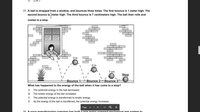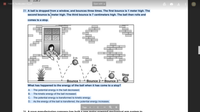
College Physics
11th Edition
ISBN: 9781305952300
Author: Raymond A. Serway, Chris Vuille
Publisher: Cengage Learning
expand_more
expand_more
format_list_bulleted
Concept explainers
Topic Video
Question
23. A ball is dropped from a window, and bounces three times. The first bounce is 1 meter high. The second bounce is meter high. The third bounce is 7 centimeters high. The ball then rolls and comes to a stop.
What has happened to the energy of the ball when it has come to a stop?
A. The potential energy in the ball decreased.
B. The kinetic energy of the ball increased.
C. The potential energy is transformed to kinetic energy.
D. As the energy of the ball is transferred, the potential energy increases.

Transcribed Image Text:### Energy Transformation in a Bouncing Ball
**Text:**
23. A ball is dropped from a window, and bounces three times. The first bounce is 1 meter high. The second bounce is \( \frac{1}{2} \) meter high. The third bounce is 7 centimeters high. The ball then rolls and comes to a stop.
**Diagram Explanation:**
The diagram illustrates the sequence of events when a ball is dropped from a height of 3 meters out of a window. It shows:
- **Bounce 1:** After being dropped, the ball rebounds to a height of 1 meter.
- **Bounce 2:** Subsequent to the first bounce, the ball achieves a height of 0.5 meters.
- **Bounce 3:** The height reached after the third bounce is 7 centimeters.
- Finally, the ball rolls and comes to a stop at ground level.
The diagram is set against the backdrop of a brick wall, a window, and a plant, indicating a typical urban environment.
**Question:**
What has happened to the energy of the ball when it has come to a stop?
**Options:**
A. The potential energy in the ball decreased.
B. The kinetic energy of the ball increased.
C. The potential energy is transformed to kinetic energy.
D. As the energy of the ball is transferred, the potential energy increases.
---
This graphical example serves as an illustration of energy transformation, particularly focusing on the transition between potential and kinetic energy as the ball loses height and eventually stops.

Transcribed Image Text:**Image Description for Educational Website:**
**Text:**
23. A ball is dropped from a window, and bounces three times. The first bounce is 1 meter high. The second bounce is \(\frac{1}{2}\) meter high. The third bounce is 7 centimeters high. The ball then rolls and comes to a stop.
**Diagram:**
The diagram illustrates the motion of a ball dropped from a window. It shows:
- A person releasing a ball from a window that is indicated to be 3 meters high.
- The ball makes its first bounce, reaching a height of 1 meter.
- The ball then makes a second bounce, reaching a height of 0.5 meters (labeled as 2 meters by error).
- The third bounce reaches a height of 7 centimeters.
- After the third bounce, the ball stops rolling.
**Question:**
What has happened to the energy of the ball when it has come to a stop?
- A. The potential energy in the ball decreased.
- B. The kinetic energy of the ball increased.
- C. The potential energy is transformed to kinetic energy.
- D. As the energy of the ball is transferred, the potential energy increases.
**Explanation:**
This illustration is useful for understanding the conservation of energy in the context of gravity and mechanical energy transformations during bouncing and rolling motions.
Expert Solution
This question has been solved!
Explore an expertly crafted, step-by-step solution for a thorough understanding of key concepts.
This is a popular solution
Trending nowThis is a popular solution!
Step by stepSolved in 2 steps

Knowledge Booster
Learn more about
Need a deep-dive on the concept behind this application? Look no further. Learn more about this topic, physics and related others by exploring similar questions and additional content below.Similar questions
- 2. Consider the concepts of kinetic energy (KE) and gravitational potential energy (GPE) as you complete these questions. A ball is held 1.4 meters above the floor. Use the terms KE of GPE as your answers. A. When the ball is held motionless above the floor, the ball possesses only B. If the ball is dropped, its energy decreases as it falls. C. If the ball is dropped, its energy increases as it falls. D. In fact, in the absence of air resistance, the amount of impact with the floor. energy. energy when the ball is held motionless above the floor equals the amount of energy atarrow_forwardAt its maximum speed, a 4 kg sloth can climb a height of 6 m in 2 minutes. A. What is the primary energy transformation that is taking place? B. What is the force required for the sloth to climb at a constant speed? C. How much work does this sloth do climbing the tree? D. How much does the potential energy increase?arrow_forward2. An object has 560 J of potential energy and 890 J of mechanical energy. How much kinetic energy does the object have?. ME = REHPE 560 560 330J= PE olog ertev 3. A slingshot rubber band with a spring constant of 850 N/m was stretched 0.33 m. A 0.4 kg rock was fired from the slingshot after it was released. a. Find the spring potential energy. PE =)2 kx? Z(850X.33) b. What is the kinetic energy of the stone once it was released? PEERE c. What is the velocity of the stone as soon as the slingshot was released?arrow_forward
- Question 6 When a student stretches a spring, what is the flow of energy? a. Energy goes into the spring and into the student. X b. There is no change in the energy of the spring, only for the student. c. There is no change in the energy of the student, but there is a change for the spring. d. Envery leaves the spring and goes to the student. e. Energy goes into the spring from the student.arrow_forwardA 100gram ball thrown vertically downward stricken the ground with a speed of 20m/s. It then bounces, and reaches a final height of 5.0 meters. a.what is the ball's kinetic energy b. What is the ball's potential energy at the 5.0-m height c. What is the ball's kinetic energy immediately after it rebounds from the surface d. What is the ball's speed immediately after it rebounds from the surfacearrow_forward17. Sketch this energy position graph. Label where the 5 spots (A to E) could be Energy vs Position Energy (J) Q 2500 1250 O -1250 -2500 Position (m) A. He is going his maximum speed B. He is stopped C. He is going his average speed D. He is going slow E. He is going fast PE KEarrow_forward
- 4. A 6.00 Kg iron ball moves at 2.75 m/s. How fast must a 2.65 g steal ball move so that the two balls have the same kinetic energy?arrow_forwardA certain force does −7 J of work in moving an object located at position A to position B. The same force then does −7 J of work in moving it back from position B to position A. No other forces did work. Was mechanical energy conserved? Was energy conserved? a. Total energy was conserved but not mechanical energy. b. Mechanical energy was conserved but not total energy. c. Both mechanical energy and total energy were conserved d. Neither mechanical energy nor total energy was conserved.arrow_forwardWhat is the best description of gravitational potential energy? a. The energy stored, dependent on the object's height from the ground. b. The strength from a moving object. c. The energy exerted through stretching or squashing an object. d. The strength stored between molecules, in chemical bonds.arrow_forward
arrow_back_ios
arrow_forward_ios
Recommended textbooks for you
 College PhysicsPhysicsISBN:9781305952300Author:Raymond A. Serway, Chris VuillePublisher:Cengage Learning
College PhysicsPhysicsISBN:9781305952300Author:Raymond A. Serway, Chris VuillePublisher:Cengage Learning University Physics (14th Edition)PhysicsISBN:9780133969290Author:Hugh D. Young, Roger A. FreedmanPublisher:PEARSON
University Physics (14th Edition)PhysicsISBN:9780133969290Author:Hugh D. Young, Roger A. FreedmanPublisher:PEARSON Introduction To Quantum MechanicsPhysicsISBN:9781107189638Author:Griffiths, David J., Schroeter, Darrell F.Publisher:Cambridge University Press
Introduction To Quantum MechanicsPhysicsISBN:9781107189638Author:Griffiths, David J., Schroeter, Darrell F.Publisher:Cambridge University Press Physics for Scientists and EngineersPhysicsISBN:9781337553278Author:Raymond A. Serway, John W. JewettPublisher:Cengage Learning
Physics for Scientists and EngineersPhysicsISBN:9781337553278Author:Raymond A. Serway, John W. JewettPublisher:Cengage Learning Lecture- Tutorials for Introductory AstronomyPhysicsISBN:9780321820464Author:Edward E. Prather, Tim P. Slater, Jeff P. Adams, Gina BrissendenPublisher:Addison-Wesley
Lecture- Tutorials for Introductory AstronomyPhysicsISBN:9780321820464Author:Edward E. Prather, Tim P. Slater, Jeff P. Adams, Gina BrissendenPublisher:Addison-Wesley College Physics: A Strategic Approach (4th Editio...PhysicsISBN:9780134609034Author:Randall D. Knight (Professor Emeritus), Brian Jones, Stuart FieldPublisher:PEARSON
College Physics: A Strategic Approach (4th Editio...PhysicsISBN:9780134609034Author:Randall D. Knight (Professor Emeritus), Brian Jones, Stuart FieldPublisher:PEARSON

College Physics
Physics
ISBN:9781305952300
Author:Raymond A. Serway, Chris Vuille
Publisher:Cengage Learning

University Physics (14th Edition)
Physics
ISBN:9780133969290
Author:Hugh D. Young, Roger A. Freedman
Publisher:PEARSON

Introduction To Quantum Mechanics
Physics
ISBN:9781107189638
Author:Griffiths, David J., Schroeter, Darrell F.
Publisher:Cambridge University Press

Physics for Scientists and Engineers
Physics
ISBN:9781337553278
Author:Raymond A. Serway, John W. Jewett
Publisher:Cengage Learning

Lecture- Tutorials for Introductory Astronomy
Physics
ISBN:9780321820464
Author:Edward E. Prather, Tim P. Slater, Jeff P. Adams, Gina Brissenden
Publisher:Addison-Wesley

College Physics: A Strategic Approach (4th Editio...
Physics
ISBN:9780134609034
Author:Randall D. Knight (Professor Emeritus), Brian Jones, Stuart Field
Publisher:PEARSON